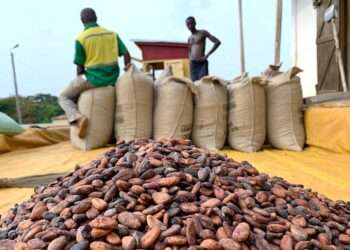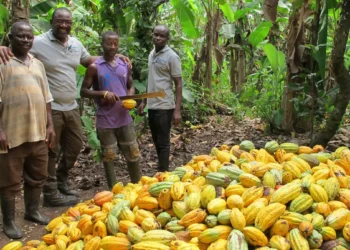The European Union (EU) has threatened to stop the purchase of cocoa from Ghana because of deforestation and child labour.
According to Dr. Emmanuel A. Dwomoh, the EU has blamed the issue on cocoa cultivation. However, he pointed illicit mining or galamsey as the main driver of the problem.
“Now they are threatening to pass a legislation that is going to prevent the EU from buying cocoa from Ghana. But we are engaging them.”
Dr Emmanuel A. Dwomoh, Deputy Chief Executive Officer
He explained that EU bases its position on the incidence of child labour and deforestation in the country. He stated that in the 70s and 80s, places like Amansie West were full of cocoa covered with forest. However, with the beginning of galamsey, all those places have been removed. Thus, when one takes a satellite image of such places, it shows red, he said. This is an indication that the place is not forest covered again, he added.
Deforestation has resulted in the loss of economic trees such Funtumia elastic (Ofuntum), Alstonia boonei (Nyamedua), Pycnanthus angolensis (Otie), among others.
Dr Dwomoh made this known when he presented a paper title “Illegal Mining in Cocoa Areas -The Position of Ghana COCOBOD”. He made the presentation on Thursday, April 15, 2021 at the National Consultative Dialogue on Small Scale Mining in Accra. Dr Emmanuel A. Dwomoh is the Deputy Chief Executive Officer of the Ghana Cocoa Board in charge of Agronomy and Quality Control.
Curbing the impacts of illegal mining on Cocoa
Dr Dwomoh made mention of what needs to be done to address the problem of illegal mining. He said there is the need for the country to find ways of handling the issue of illegal mining.
He indicated that over 5,040.70 hectares of land have been affected by galamsey activities in the Western Region. This affected about 5,702 farmers. Also, in the Ashanti and Eastern regions, a total of 11,508.51 hectares of land have been affected by galamsey activities. As a result, 9,093 farmers have been affected. He ,therefore, called for the development of policies that prohibited mining in cocoa farms.
“Where mining is inevitable on any cocoa farm, the miner should pay compensation according to COCOBOD recommended projected revenue formula. This formula includes the cost of destruction of properties.”
Dr Emmanuel A. Dwomoh, Deputy Chief Executive Officer.
He added that there should be “no issuance of license or lease for mining in cocoa farm lands until public forum is organized”. He said the public forum must be done at a centralized area in communities where a lot of the inhabitants can attend.
Also, Dr Dwomoh said no concession area (topo sheet) should be given to companies from Accra without public forum in a cocoa community. The Minerals Commission should do ground truthing before issuance of license, he pointed out.
Touching on swollen shoot disease, he said COCOBOD has secured over $200 million for rehabilitation of affected farms. He reiterated that fact that cocoa is the main stay of Ghana’s economy. Cocoa generates more than $2 billion in foreign exchange annually as a major contributor to Gross Domestic Product, he added.
Read also: Galamsey fight, a national emergency- Stakeholders to government























